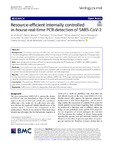Resource-efficient internally controlled in-house real-time PCR detection of SARS-CoV-2
Michel, Janine
Neumann, Markus
Krause, Eva
Rinner, Thomas
Muzeniek, Therese
Grossegesse, Marica
Hille, Georg
Schwarz, Franziska
Puyskens, Andreas
Förster, Sophie
Biere, Barbara
Bourquain, Daniel
Domingo, Cristina
Brinkmann, Annika
Schaade, Lars
Schrick, Livia
Nitsche, Andreas
Background
The reliable detection of SARS-CoV-2 has become one of the most important contributions to COVID-19 crisis management. With the publication of the first sequences of SARS-CoV-2, several diagnostic PCR assays have been developed and published. In addition to in-house assays the market was flooded with numerous commercially available ready-to-use PCR kits, with both approaches showing alarming shortages in reagent supply.
Aim
Here we present a resource-efficient in-house protocol for the PCR detection of SARS-
CoV-2 RNA in patient specimens (RKI/ZBS1 SARS-CoV-2 protocol).
Methods
Two duplex one-step real-time RT-PCR assays are run simultaneously and provide information on two different SARS-CoV-2 genomic regions. Each one is duplexed with a control that either indicates potential PCR inhibition or proves the successful extraction of nucleic acid from the clinical specimen.
Results
Limit of RNA detection for both SARS-CoV-2 assays is below 10 genomes per reaction. The protocol enables testing specimens in duplicate across the two different SARS-CoV-2 PCR assays, saving reagents by increasing testing capacity. The protocol can be run on various PCR cyclers with several PCR master mix kits.
Conclusion
The presented RKI/ZBS1 SARS-CoV-2 protocol represents a cost-effective alternative in times of shortages when commercially available ready-to-use kits may not be available or affordable.
Files in this item

